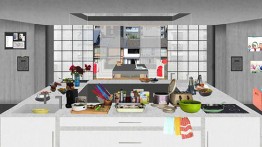Eleanore Pettersen Lecture | Maria Shéhérazade Giudici: Carefree, not careless
Thursday, November 10, 2022, 6:30 - 8:30pm

Eugenie Hanae Bliah, Socks: Collective Living for Housewives in Japan (2014)
This lecture will be conducted in-person in room 315F and through Zoom.
For Zoom attendance, please register in advance here.
For In-Person attendance, please register in advance here.
Maria Shéhérazade Giudici is this year's Eleanore Petterson Lecturer. In addition, this event is part of the Architectures of Transition series.
Care is one of the most powerful keywords in contemporary discourse, as it becomes increasingly clearer that the ecological crisis we face is entangled with forms of social and political violence. However, the way Western culture understands care is problematic: constructed as a dyadic, unidirectional effort geared to foster growth, the 'care' capitalism promotes might well be one of the hallmarks of environmental exploitation, rather than a solution to it. In this talk we will retrace the way such a culture of care was first articulated through the development of domestic space, analyzing the way in which the heteronormative family has been constructed as the hegemonic model of care. Through a series of case studies of residential architecture, we will discuss how the emergence and naturalization of specific architectural types has been both the cause and the effect of the effort to construct the very subjectivity of motherhood as the ultimate locus of caring. Modern housing educated its inhabitants to an idea of care that is inadequate, perhaps even dangerous when scaled up to the planet. Studying and challenging its domestic roots might help reimagine the spatial and political possibility for other forms of care to emerge: socialized rather than individualized, based on solidarity rather than on the protection of one's possessions.
The lecture will be followed by a discussion moderated by Elisa Iturbe.
Maria Shéhérazade Giudici leads the History and Theory course at the School of Architecture of the Royal College of Art and coordinates the PhD Programme of the Architectural Association. Maria is the founder of research platform Black Square and the editor of AA Files; her work focuses on the relationship between space and the construction of subjectivity.
Elisa Iturbe is Assistant Professor at the Cooper Union. Her research is currently focused on the relationship between energy, power, and form and her writings have been published in AA Files, Log, Perspecta, Antagonismos, New York Review of Architecture, and more. Iturbe is also co-founder of Outside Development, a design and research practice.
The Eleanore Pettersen Lecture Series
The Eleanore Pettersen Lecture, established through a generous gift to The Irwin S. Chanin School of Architecture, is dedicated to the voices of women in architecture as a lasting tribute to Ms. Pettersen's significant impact in the world of architecture and her love of The Cooper Union. Pettersen, who had worked as an apprentice to Frank Lloyd Wright and would later design the post-White House home of Richard M. Nixon, was one of the first women to be licensed as an architect in New Jersey, and developed a successful practice there that spanned over fifty years.
Lectures in this series have been given by Toshiko Mori (2005), Phyllis Lambert (2006), Elizabeth Wright Ingraham (2008), Billie Tsien (2009), Francine Houben (2011), Sarah Wigglesworth (2013), and Farshid Moussavi (2014), Mabel Wilson (2020), Lesley Lokko + Sumayya Vally (2021), Samia Henni (2022).
The Architectures of Transition Lecture Series
Humanity has reached an ecological brink and against this daunting horizon, architecture’s environmental response, focused largely on building technology and techno-optimism, has failed. The climate crisis is intensifying unabated, in part because architecture, as both a discipline and a practice, continues to replicate the spatial, cultural, and material patterns that constitute an energy-intensive way of life.
This year’s lecture series, curated by Elisa Iturbe, interrogates architecture’s alliance with the project of carbon modernity, from the early moments of industrialization to today’s advanced stages of fossil capitalism. At stake is architecture’s role in broad civilizational transition—unquestionable and problematic in the context of our last energy transition into fossil fuels, yet indeterminate and full of possibility in relation to the transitions to come.
Together, these lectures and discussions will bring space and form into dialogue with energy and power, reframing the causal landscape of the climate crisis and reimagining our vocabulary of alternatives.
This event is free and open to the public. Registration is required.
View the full Fall 2022 Lectures and Events List.
Located at 7 East 7th Street, between Third and Fourth Avenues




